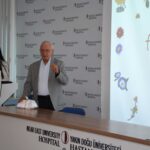
Cyprus’ endemic plant diversity and their medicinal, cosmetic, and economic potential were evaluated in light of scientific data at the “Aromatic Plants of Cyprus” event held at Near East University.
Organized by the Department of Landscape Architecture, Faculty of Agriculture, Near East University, the “Aromatic Plants of Cyprus” event examined the island’s natural heritage from a scientific perspective. Prof. Dr. K. Hüsnü Can Başer, Director of the Near East University Graduate Education Institute and Head of the Department of Pharmacognosy, Faculty of Pharmacy, explained Cyprus’s unique plant diversity and the scientific value of the essential oils found in these plants.
The event, which drew a large number of producers, academics, and students, aimed to promote the endemic and aromatic plants of Cyprus, one of the richest ecosystems in the Mediterranean, and to highlight their medicinal, cosmetic, and economic potential.
Prof. Dr. K. Hüsnü Can Başer, who presented scientific data on the effects of Cyprus’s geomorphological structure, climate, and flora on its aromatic diversity, stated that the island is home to more than 1,610 native plant species, 108 of which are endemic. Prof. Dr. Başer emphasized that this richness makes Cyprus an important center not only for its natural beauty but also for pharmaceutical and aromatic plants. Prof. Dr. Başer stated that essential oils obtained from plants growing in Cyprus have wide-ranging potential in the medical, cosmetic, and food sectors in his scientific research, and emphasized the importance of protecting and sustainably utilizing these valuable species from environmental and economic perspectives.

The Healing Power of Cyprus Plants!
Prof. Dr. K. Hüsnü Can Başer, Director of the Graduate Education Institute and Head of the Department of Pharmacognosy at Near East University, stated that research on aromatic plants growing in Cyprus has shown that the essential oils obtained from these plants possess significant health benefits. Prof. Dr. Prof. Dr. K. Hüsnü Can Başer emphasized that analyses revealed that Cyprus thyme (Origanum dubium) stands out for its strong antibacterial properties, while Thymus capitatus (Tımari) is effective against bacteria that cause stomach upsets. Prof. Dr. K. Hüsnü Can Başer also noted that Cyprus marjoram has potential for use in malaria treatment, while Cyprus sage (Salvia veneris) is noted for its antimicrobial and natural insect repellent properties. Prof. Dr. Başer also emphasized that endemic species such as Cyprus wild mint (Mentha longifolia subsp. cyprica) can be utilized as natural ingredients in medicine, pharmacy, and cosmetics.
Prof. Dr. Başer concluded his presentation by saying, “The flora of Cyprus should be viewed and valued not only as a natural resource and landscape, but also as a powerful scientific resource that can contribute to human health.”
At the event, which concluded with a question-and-answer session, Prof. Dr. Özge Özden, Dean of the Faculty of Agriculture at Near East University, thanked Prof. Dr. K. Hüsnü Can Başer. Stating that they place great importance on rural development, Prof. Dr. Özden said, “Aromatic plants and their cultivation are also of great significance for sustainable development goals.” Prof. Dr. Özden also stated that they are continuing their work to scientifically analyze Cyprus’s rich plant diversity and to raise awareness of protecting these values. She said, “I would like to thank Prof. Dr. K. Hüsnü Can Başer, who shared his vast experience with us, and everyone who contributed. I wholeheartedly believe that such events will also inspire our young researchers.”

